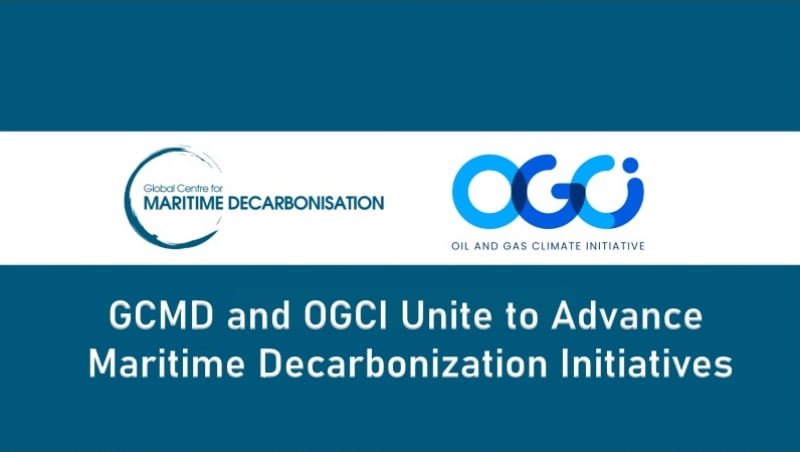The Oil and Gas Climate Initiative (OGCI) and the Global Centre for Maritime Decarbonisation (GCMD) announced a two-year coalition partnership agreement to work on a range of solutions to decarbonize the shipping industry.
Areas of collaboration will focus on energy efficiency to reduce emissions, future fuels that are lower in carbon intensity, such as ammonia, methanol, and biofuel blends, and onboard carbon capture pathways.
Decarbonizing transport is a critical pathway to net zero and a key focus for OGCI – a CEO-led initiative of 12 of the world’s leading oil and gas companies. Around a fifth of transport emissions come from aviation and marine sectors, and these emissions are harder to abate than those from road transport, which can more easily switch to electric power.
OGCI is working on the development of low-carbon fuels, such as biofuels, ammonia, hydrogen, and E-fuels, and has supported the development of onboard carbon capture and storage (OCCS) for ships. OGCI also brings expertise and knowledge from developing land-based carbon capture projects at CCUS hubs to the partnership to mature OCCS, which is at a much earlier stage.
GCMD is supporting the decarbonization of the maritime sector through pilots and trials. Their initiatives include enabling ammonia as a marine fuel, assuring the quality, quantity, and emissions abatement of drop-in green fuels, unlocking the carbon value chain through OCCS, and scaling the adoption of energy efficiency technologies.
Most recently, GCMD’s projects include a landmark study on offloading onboard captured carbon dioxide, a report examining the propensity of biofuel degradation in marine supply chains, and a pilot addressing concerns of long-term, continuous biofuels use on vessel operations.
Complementary Strengths for End-to-End Onboard Carbon Capture at Scale
The partnership builds on an existing collaboration between OGCI and GCMD known as “Project REMARCCABLE,” an initiative to demonstrate end-to-end onboard carbon capture at scale. Phase 1 of this project is now complete, and findings will be published later this year.
This partnership further complements GCMD’s efforts, helping to unlock the carbon value chain downstream from OCCS, including offloading, distribution, utilization, and sequestration or utilization of onboard captured CO2.
As onshore CCUS hubs develop, shipping can be used to transport CO2 from sources to sinks. Sharing best practices, coordinating efforts, and harmonizing CO2 transport standards can also accelerate the development of CCUS hubs.
OGCI’s Managing Director, Julien Perez, said “This partnership is a great example of cross-industry collaboration to achieve emissions reductions as it combines knowledge and expertise from two critically important industries – energy and shipping – to unlock solutions to help decarbonize this hard-to-abate sector.”
Professor Lynn Loo, CEO of GCMD, said “Just as our eyes are on decarbonizing shipping, we must not forget shipping’s critical role in transporting the next generation of energy from where it’s produced to where it’s needed. Our partnership with OGCI will lend an important lens on shipping’s role in the global fuel transition. As our Coalition partner, we look forward to forging pathways to build up the portfolio of viable solutions for shipping to achieve its net-zero targets.”
About OGCI
OGCI is a CEO-led initiative comprised of 12 of the world’s leading energy companies focused on leading the industry’s response to climate change and accelerating action to a net zero future consistent with the 2015 Paris Agreement. OGCI’s members are Aramco, bp, Chevron, CNPC, Eni, Equinor, ExxonMobil, Occidental, Petrobras, Repsol, Shell and TotalEnergies.
About GCMD
The Global Centre for Maritime Decarbonisation (GCMD) was established as a non-profit organization on August 1, 2021, with the mission to support the decarbonization of the maritime industry by shaping standards, deploying solutions, financing projects, and fostering cross-sector collaboration. Founded by six industry partners—BHP, BW Group, Eastern Pacific Shipping, Foundation Det Norske Veritas, Ocean Network Express, and Seatrium (formerly Sembcorp Marine)—GCMD also receives funding from the Maritime and Port Authority of Singapore (MPA) for qualifying research and development programs and projects.
To date, over 100 center- and project-level partners have joined GCMD, contributing funds, expertise, and in-kind support to accelerate the deployment of scalable low-carbon technologies and reduce adoption barriers. Since its establishment, GCMD has launched four key initiatives aimed at addressing technical and operational challenges: deploying ammonia as a marine fuel, developing an assurance framework for drop-in green fuels, unlocking the carbon value chain through shipboard carbon capture, and closing the data-financing gap to promote energy efficiency technologies. GCMD is strategically located in Singapore, the world’s largest bunkering hub and second-largest container port.
Source GCMD

